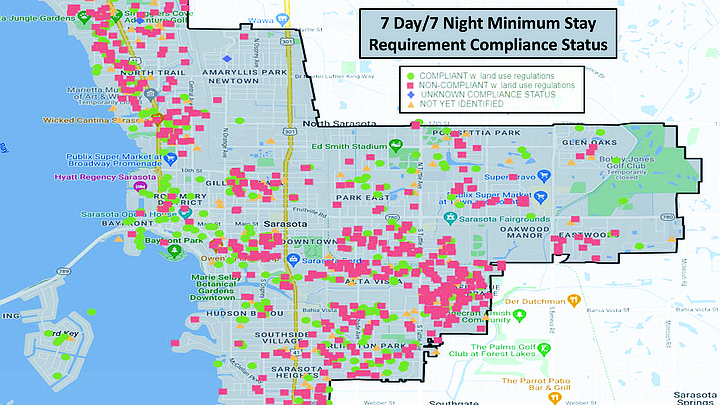- April 4, 2025
-
-
Loading

Even as city officials grapple with the details of how to best expand Sarasota’s vacation rentals ordinance citywide, state legislation may very well preempt some aspects of local efforts to manage the proliferation of short-term rentals throughout the city’s neighborhoods.
That includes, potentially, the city’s ability to recover its costs to implement a registration and monitoring program.
Just last fall, the City Commission approved an increase in registration, renewal, inspection and other fees associated with governing vacation rentals on the barrier islands.
Those included raising the initial application fee to $500, the annual renewal fee to $350 and a re-inspection fee, should one be necessary, of $100. The fee hikes were part of an effort to help the city recoup its expenses to enforce the ordinance, particularly when it is extended throughout the city.
An update to current vacation rental legislation, Senate Bill 280, though, would limit local governments to an application fee of $150 and a renewal fee of $50.
“I guess the Legislature probably has the authority to do that, but on the other hand, there is case law that says when you have a regulatory fee like this, the local government is entitled to recoup its costs, so it's definitely contrary to that,” City Attorney Robert Fournier told the commission during its Jan. 2 meeting.
For that reason and others, he recommended commissioners consider delaying a second reading of the ordinance until legislation is passed in its final form.
Several residents during the public comment period objected to a proposed section of the citywide ordinance that would allow additional occupancy of a vacation rental if it meets certain performance standards, incentives similar to those proposed as a compromise by an attorney representing three Lido Key properties in a Harris Act claim against the city.
Commissioner Debbie Trice motioned to remove that provision from the day’s discussion, which was approved unanimously. The provision could be considered as an amendment at a later date.
Fee limits aside, Fournier said the pending state legislation isn’t all bad news. Although it prevents local governments from prohibiting vacation rentals, It does preempt licensing to the state.
“It does specifically authorize the designation of a responsible party who is capable of responding to complaints, so that's a good thing,” Fournier said. “And it does, and I think this bodes well for the Harris Act claims, recognize the authority of the jurisdiction to state a maximum occupancy limit based on the number of bedrooms. That wasn't in the law before and I think that specific recognition is important and at least will undercut anything in a Harris Act claim that the city doesn't have the right to limit the occupancy.”
Residents have also spoken frequently about nuisances associated with vacation rentals including noise, overflow parking, general disruptions to the ease and enjoyment of their property and permanent “For Rent” signs installed near the streets.
Commissioner Erik Arroyo maintained his consistent opposition to expanding the ordinance citywide, likening it to “using a sledgehammer to kill a fly.” He added the ordinance appears to do little to address the core issues brought forth by residents with regard to vacation rentals in their neighborhoods.
“Issues that we talked about like the noise issues, trash and traffic haven’t been mentioned today, but I often hear it will that be resolved with an annual inspection,” he said. “Should we be establishing non-law enforcement programs that will cost more than they generate? Because now we're trying to play catch-up for a program that we established that costs way more for just a small number of vacation rentals on the barrier islands.
“I think the best course of action would be to hold off on this because we don't know what's going to happen with the Legislature. These are valid concerns.”

Commissioners eventually approved the ordinance on the first reading by a 4-1 vote, with Arroyo opposed, but not before Trice suggested new provisions be added by second reading. Those include all vehicles be parked on the vacation rental property; further refinement of the term “occupant” to mean only registered guests remain on-site after 11 p.m.; and that a simple guide to the city’s regulations be readily available to vacation rental operators and their guests.
Once approved on second reading, the initial application period for existing vacation rentals will be July 1-Oct. 31, 2024. Staff will send letters to vacation rental owners in advance of the application period if their properties are required to be registered. Staff will provide guidance and support throughout the application process.
Hiring and training of additional staff members could take as long as five months. Operation of a vacation rental anywhere in the city without a certificate of registration after Jan. 1, 2025, will be a violation of the ordinance.
Correction: This story was updated to correct the new fee structure for vacation rental applications.